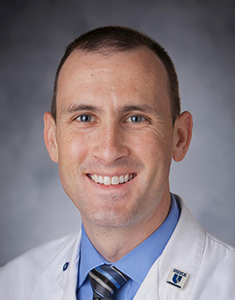Thank you for your interest in the Duke Department of Medicine.
Medical students gain valuable experience from the inpatient and outpatient medical clerkships during year two, have the opportunity to explore research topics during year three, and participate in 4-week sub-internship rotations during year four.
The Visiting Students Program offers a variety of elective rotations for medical students.
Leadership

Clerkship Coordinator

Staff Assistant
Inpatient Medicine Clerkship
Duration and setting: The internal medicine clerkship at Duke is an 6-week rotation. Students each rotate through 2 of 3 hospitals during that time: Duke University Hospital, Duke Regional Hospital, and the Durham VA Medical Center.
Student roles and responsibilities: During the second-year clerkship in medicine, students each are assigned two four-week blocks with a trainee team taking care of patients. Students are expected to take primary responsibility for the care of their patients including admitting them to the hospital, following them daily, writing notes in the EMR, keeping track of what has happened to their patients since they were last seen, communicating with consultants and interprofessional team members, have a good understanding of the rationale for and outcomes of all diagnostic tests and therapeutic interventions, and updating patients and families. Students are expected to complete oral presentations on rounds. The average daily census per student is 2-4 patients.
If you have any questions about the required Medicine clerkship, please contact the Director of the Clerkship, Dr. John K. Roberts (john.roberts@duke.edu) or the Medicine Clerkship Office (imclerkship@duke.edu). This course is not available to students from outside institutions.
Outpatient Medicine Clerkship
Duration and setting: The ambulatory internal medicine clerkship at Duke takes place in the PIONEER (outPatient Integrated lONgitudinal ExpERience) rotation, a 16-week ambulatory block during the clerkship year. During this 16-week block, students spend one half day each week with a single internal medicine preceptor (either in primary care or in a subspecialty) in their outpatient clinic. These clinics are either on-site at Duke University Medical Center or at off-site internal medicine clinics.
Student roles and responsibilities: During the ambulatory clerkship, students perform history and physical exams, formulate assessment and plans including a discussion of the differential diagnosis for one or more problems, do oral presentations, and document the encounters. They also focus on health maintenance, ordering of appropriate tests and referrals, counseling of patients and families, and transitions of care. They are exposed to team members of different professions in the ambulatory setting and are expected to practice effective communication.
Courses
See the School of Medicine bulletin for more information on courses.
Required Courses
MEDICINE 205C. Medicine
MEDICINE 206C. Primary Care Leadership Track (PCLT) – Medicine.
PIONEER. Outpatient Integrated Longitudinal Experience
Second Year, Two-Week Clinical Selectives
MEDICINE 221C. A Taste of Palliative Care
MEDICINE 2223C. Gastroenterology Selective
MEDICINE 225C. Introduction to Hospital Medicine
MEDICINE 226C. Introduction to Endocrinology
MEDICINE 227C. Introduction to Consultative Cardiology
MEDICINE 229C. Adult Nephrology
MEDICINE 231C. Introduction to Infectious Diseases
MEDICINE 232C. Introduction to Rheumatology
MEDICINE 233C. Interventional Pulmonology
Research opportunities for Duke medical students
Department of Medicine faculty members are program directors in five different Third Year (scholarly experience) study programs, and they are a source of information regarding potential mentors and research projects. We want to help you find a research experience that is stimulating, productive, rewarding, and — most of all — the right fit for you.
Tips for Medical Students on finding your Research Mentor for Third Year.
The Department also facilitates the Academic Medicine Research Series, held three times a year in conjunction with the Duke Careers in Internal Medicine Interest Group (CIMIGro). Join us in exploring academic career options and reviewing research literature.
Contact John Roberts, MD, Director of Undergraduate Medical Education and Clerkship Director, for more information.
Visit the Duke University School of Medicine to learn about Duke's internationally recognized Doctor of Medicine program.
Duration and setting: The internal medicine sub-internship is a 4-week rotation. Students rotate on one of the following services: Duke University Hospital General Medicine Teaching Service, Duke University Hospital Hospitalist Service, Durham VA Medical Center General Medicine teaching service, the Duke University Hospital Medical Intensive Care Unit, or the Duke University Hospital Cardiac Intensive Care Unit.
Student roles and responsibilities: During the sub-internship in medicine, students are expected to truly act as the Intern for their patients. To achieve this, they take primary responsibility for the care of their patients including admitting them to the hospital, writing notes in the EMR, entering orders, calling consults and communicating with consultants in follow-up, communicating with nurses and case management, updating family members, making decisions regarding diagnostic tests and therapeutic interventions, and coordinating discharge instructions and follow-up. Students are expected to complete oral presentations on rounds. The average daily census per student is 4 patients.
Fourth Year, Sub-Internship
MEDICINE 401C. Internal Medicine Sub-Internship
MEDICINE 402C. Medical Sub-Internship in Hematology-Oncology
MEDICINE 404C. Cardiac Intensive Care Unit Sub-Internship
MEDICINE 405C. Intensive Care Medicine Sub-Internship
MEDICINE 407C. Sub-Internship in Internal Medicine/Psychiatry
Fourth Year, Clinical Science Electives
MEDICINE 412C. Hospital Medicine
MEDICINE 414C. Introduction to Outpatient Primary Care Internal Medicine
MEDICINE 415C. Introduction to Clinical Management of Obesity
MEDICINE 416C. Effective Clinical Teaching
MEDICINE 423C. Rheumatology
MEDICINE 424C. Fluids and Electrolytes
MEDICINE 425C. Clinical Hematology
MEDICINE 427C. Hospices and Palliative Medicine
MEDICINE 428C. Metabolism and Endocrinology
MEDICINE 431C. Adult Allergy and Clinical Immunology
MEDICINE 432C. Introduction to Duke Medical Intensive Care Unit
MEDICINE 434C. Outpatient Hematology-Oncology (Duke or Durham VA)
MEDICINE435C. Gastroenterology
MEDICINE 437C. Rheumatology 2-week Elective
MEDICINE 438C. Hematology and Oncology Consults (Durham VA)
MEDICINE 439C. Grief and Bereavement 101
MEDICINE 440C. Clinical Infectious Diseases
MEDICINE 442C. Clinical Arrhythmia Service
MEDICINE 444C. Clinical Heart Failure and Cardiac Transplantation
MEDICINE 445C. Consultative Cardiology
MEDICINE 446C. Nephrology
MEDICINE 447C. Practitioners and Patients: The History of Clinical Medicine
MEDICINE 449C. Geriatric Medicine
MEDICINE 452C. Clinical Medical Ethics: What Would a Good Physician Do?
MEDICINE 453C. Medicine, Humanities and the Arts
MEDICINE 454C. Humanities for Health Justice
Careers in Internal Medicine Interest Group (CIMIGro)
CIMIGro is a student-run organization at Duke University School of Medicine whose purpose is to orient medical students to the field of Internal Medicine and its various sub-specialties.
Leadership: Haley Hutchinson, President & Communications Chair, Stephanie Sun, Treasurer & Logistics Chair, Judah Kreinbrook, Mentorship & Education Co-chair, Mindy Kim, Mentorship & Education Co-chair.
Grand Rounds
Medical students are welcome to attend monthly department Grand Rounds talks.
The Visiting Medical Student Program enriches both Duke University and the visiting medical student. Applicants must be in good academic standing and actively progressing toward a Doctor of Medicine degree, and receive academic credit by the home school, at an LCME accredited institution, a Doctor of Osteopathic Medicine at a COCA accredited institution, or an approved/affiliated international institution.
Contact
Scott Campbell
The Visiting Students Program
School of Medicine
Registrar's Office
Box 3878 Duke Medical Center
Durham, NC 27710
919-684-8042
scott.campbell@duke.edu
Medical Student Clerkship Program
Undergraduate Medical Education
Department of Medicine
Duke University Medical Center
DUMC Box 3182
Durham, NC 27710
Phone: 919-660-4329
imclerkship@duke.edu


